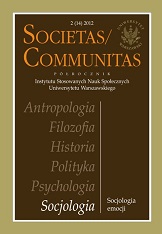Dlaczego rewolucjoniści (nie) są pozbawieni emocji? Rola emocji w teoriach rewolucji
Why revolutionaries are (not) without emotion? Emotions in theories of revolution.
Author(s): Jarosław ChodakSubject(s): Social Sciences
Published by: Instytut Stosowanych Nauk Społecznych Uniwersytetu Warszawskiego
Keywords: revolution; emotions; crowd; mobilization
Summary/Abstract: Emotions belonged to the explanatory premise of the early theoretical reflection on revolution. Both G. Le Bon and the school of the natural history of the revolution noted the importance of the feelings in the behavior of revolutionaries. Psycho-sociological theorists of revolution in the 1960s and 1970s also pointed to the collective emotional state of mind of the revolutionary actors. Emotions “disappear” from the theory of revolution in the second half of the twentieth century. The state-centred perspective put emphasis on structural relationships and conflicts between differently situated groups, social classes and states. Emotions were also irrelevant to the rational choice theorists who analyzed the rational actor. The prospect of the return of emotions to the analysis of the revolution came with the new trends in social research. The next generation of theorists of revolution attempted to take into account the earlier “neglected” variables. Taking cultures into account allows for the analysis of the relationship between collective memory, the role of symbols and rituals, and emotional states of the revolutionaries. Emotions have also become an important variable in theories of social movements. Adaptation of theoretical frameworks developed in the sociology of emotions and social movements makes it possible to incorporate the emotional component in the theory of revolution.
Journal: Societas/Communitas
- Issue Year: 2012
- Issue No: 14 (2)
- Page Range: 55-70
- Page Count: 15
- Language: Polish

